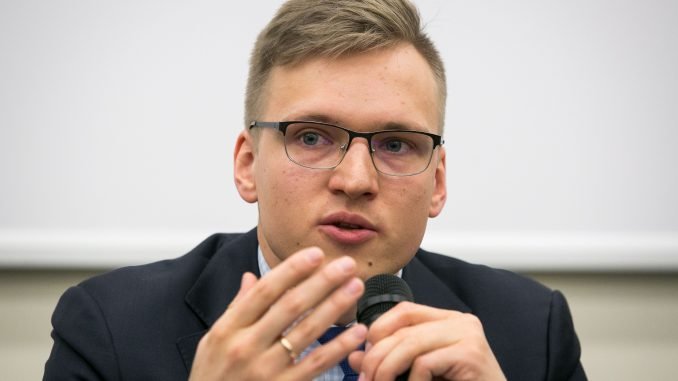
Propaganda and disinformation backed by hostile states remains a relevant challenge even while the topic itself is no longer discussed as widely as it was two or three years ago. During the Maidan revolution, Russia began an unprecedented propaganda campaign against Ukraine, which was one of the core pillars of Moscow’s hybrid warfare, making the question of propaganda a part of the European Union‘s agenda, Vytautas Keršanskas writes on lrt.lt.
The leaders of Lithuania and several other EU member states agreed already in 2015 that the Union must take action to combat hostile propaganda and took first steps – established a strategic communication department (EU East StratCom), intended to deconstruct and unveil lies spread by Russia.
More than three years later, today we can say that other than this institution, which performs a significant task, but is granted inadequately small resources, realistically, no other steps were taken. This was also concluded by EU leaders meeting for a summit in late June and deciding to task the chief EU official for foreign and security policy Federica Mogherini with preparing a full strategic and action plan.
Since the appointment of F. Mogherini, who represents the Italian centre-left Democrat party, she has been criticised of her lenient view of Russia. Thus, it comes as no surprise that during her leadership of the EU external service, it was not “activated” for more intensive solving of propaganda problems. While thanks to individual officials and departments’ efforts regarding this question, it cannot be claimed that the EU has done nothing at all, criticism on inactivity at the political-leadership level is completely justified. And without a leader, F. Mogherini in this case, it would be naïve to expect leadership.
On the other hand, combatting hostile propaganda and disinformation and the international level is inherently a difficult challenge. While various international law documents condemn, for example war propaganda or incitement of hatred, in the age of globalisation and digitisation, information spread has landed in a legal vacuum and tracing its primary source is becoming especially difficult. International organisations can only condemn such practices, especially when states, directly or through proxies, do so abroad. However, without identifying and condemning, international organisations have no other means.
Thus the challenge is left to the states themselves to take matters in hand, needed for reducing hostile propaganda: from limiting broadcasts to making stricter legislation, to improving media literacy. Thus, perhaps accusing the EU or more accurately F. Mogherini-led European External Service of being inactive is unjustified?
Nevertheless, one must conclude that the EU is not your typical international organisation and has far more tools to actively contribute to reducing propaganda spread among its members. For example, the European audio-visual directive is not adapted to conditions of the sort of information war that Russia is maintaining against individual EU member states and the EU itself. Steps are not being taken to amend it even while it often limits member states’ freedom to take stricter steps to limit propaganda.
Measures must be taken to make the financing channels for various propaganda dissemination channels – starting with traditional news media and finishing with various institutes, NGOs and movement – more transparent. Support for media literacy and independent media could also be supported by the Union’s financial instruments.
Over three years, F. Mogherini has by all means ignored the question of hostile propaganda and disinformation, but is now tasked at the highest level to take action. This is a significant shift, primarily because this was unanimously recognised as a problem by all 28 member states, despite having long not been recognised by many members as being one. Second, the European Council ruling cannot be ignored and individual member states will have significant instruments to oversee so that F. Mogherini would make sure to accomplish the ruling. This is an opportunity for Lithuania, which at the EU level is among the most experienced in combatting hostile propaganda.
